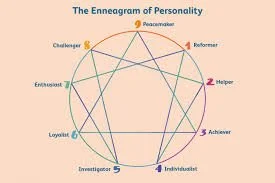The Enneagram
Understanding the Enneagram: A Journey Through Personality
The Enneagram, a powerful tool for personal and interpersonal understanding, has gained immense popularity across various fields, including psychology, coaching, and spiritual development. Its roots can be traced back to the early 20th century, with significant contributions from various thinkers and the establishment of the Enneagram Institute in the late 1970s.
The modern popularisation of the Enneagram is largely credited to Oscar Ichazo and Claudio Naranjo. Ichazo, a Chilean psycho-spiritual teacher, developed a system of personality types that he referred to as "the Enneagram of Personality." He introduced the Enneagram as more than just a typology; he viewed it as a tool for personal transformation. Naranjo, a psychiatrist, built upon Ichazo's work, bringing the Enneagram into the realm of psychology by integrating it with psychotherapy. His efforts culminated in the establishment of the Enneagram Institute in 1978, which further solidified the Enneagram's place in personal development.
The Enneagram identifies nine distinct personality types, each characterised by unique motivations, fears, and behaviours. According to the Enneagram Institute, "The Enneagram is a map of the human psyche, providing insight into how we see the world, how we interact with others, and how we can grow." This map helps individuals navigate their own inner landscape while fostering deeper connections with others.
Each type is defined by its core desire and fear, which significantly shapes the individual's behaviour. For example, Type One, the Reformer, is motivated by a desire for integrity and a fear of being corrupt. In contrast, Type Nine, the Peacemaker, seeks harmony and fears conflict and disconnection. Understanding these dynamics is fundamental to leveraging the Enneagram for personal growth.
The Enneagram is not merely a categorisation of personality; it is a tool for understanding the underlying motivations driving behaviour. As the Enneagram Institute aptly states, "Understanding your type can help you identify your strengths and weaknesses, shift unhelpful patterns, and embark on a path toward personal growth." Through this lens, individuals can explore pathways to become their most authentic selves, facilitating both inner work and improved relationships.
Furthermore, the Enneagram can be used in organisational settings. Teams that understand the different personality types can foster collaboration and mitigate conflict. As noted by Enneagram experts, "When we know ourselves and our colleagues deeply, we can communicate more effectively and work together more harmoniously."
In summary, the Enneagram serves as a multifaceted framework that elucidates the complexities of human personality. The contributions of Oscar Ichazo and Claudio Naranjo paved the way for this profound approach to self-discovery, which is now expertly advanced by institutions like the Enneagram Institute. By embracing the teachings of the Enneagram, individuals and organisations alike can embark on a journey of transformation, leading to richer connections and a deeper understanding of oneself and others.
As you explore your own Enneagram type, remember, "The goal of the Enneagram is to awaken to the essence of who we are, beyond our personality." Embracing this journey can illuminate a path toward both personal and collective growth.
Type 1 - The Reformer
Ones are principled, disciplined, and have a strong sense of right and wrong. They strive for perfection and have a keen eye for detail, often becoming critical of themselves and others when standards are not met.
Type 2 - The Helper
Twos are empathetic, generous, and put the needs of others first. They seek validation through their caring nature, often becoming overly involved in the lives of those they help, which can lead to feelings of neglect for their own needs.
Type 3 - The Achiever
Threes are ambitious, goal-oriented, and highly driven individuals. They thrive on success and recognition, often adapting their image to appeal to others, which can lead to a disconnection from their authentic selves.
Type 4 - The Individualist
Fours are sensitive, introspective, and deeply attuned to their emotions. They value uniqueness and often feel misunderstood, leading them to express their individuality through art or creative pursuits.
Type 5 - The Investigator
Fives are analytical, curious, and value knowledge above all else. They enjoy understanding the complexities of the world around them but can become withdrawn and isolated when feeling overwhelmed.
Type 6 - The Loyalist
Sixes are responsible, loyal, and committed individuals who value security and support from their communities. They often anticipate potential risks and can struggle with anxiety, seeking reassurance from those close to them.
Type 7 - The Enthusiast
Sevens are adventurous, spontaneous, and have an insatiable desire for new experiences. They often avoid pain or discomfort, leading them to seek pleasure and excitement, which can result in a lack of commitment or follow-through.
Type 8 - The Challenger
Eights are assertive, confident, and natural leaders who value strength and control. They are protective of themselves and others but can come across as confrontational, struggling to show vulnerability.
Type 9 - The Peacemaker
Nines are easygoing, accommodating, and seek harmony in their environment. They often avoid conflict and may blend in with those around them at the expense of their own desires and opinions, leading to inner conflict.
